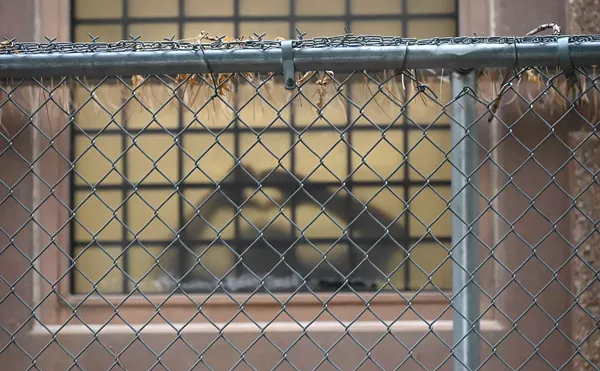For the vast majority of American news consumers, the answer to these questions is "no," and that's hardly surprising. During the waning years of the twentieth century, the amount of international reporting by most domestic media outlets was in steady decline, and while that equation has improved to some degree since 9/11, the overseas stories that get the most coverage these days are generally related to terrorism, U.S. military action, natural disasters such as December's Asian tsunami and last month's Indonesian earthquake, or, in recent weeks, Camilla Parker Bowles. As a result, suffering of the sort that's taking place in Uganda -- where captured boys are forced to take up arms against the government of President Yoweri Museveni and seized girls are turned into sex slaves -- seldom receives the attention it deserves.
That's where Jim Chesnutt comes in. He's the president and founder of Denver-based News Corps International, a small but committed enterprise dedicated to reporting important humanitarian stories that are being given short shrift by the mainstream media. Chesnutt and News Corps vice president Mark Amann recently returned from Uganda, where they spent four weeks between mid-February and mid-March, and a sample of their labors can be found at NCI's Internet destination, www.newscorps.com. The site's home page features a photo of Wilborne, a thirteen-year-old boy who was hospitalized after being wounded in a firefight with government soldiers. "He had been abducted three years earlier, and he told me how the LRA had made him fight and kill," Chesnutt says. "His best estimate was that he had killed twenty people, and yet he looked like the sweetest kid, and seemed as gentle as anyone you could ever meet. That was pretty powerful. It's amazing what any of us would be capable of if there was a gun to our head."
Equally wrenching to witness were the extremes to which many Ugandans must go to prevent their offspring from being snatched by LRA personnel. "Rebels typically come into villages at night, and the locals can't fend them off," Chesnutt notes. "So each evening, up to 50,000 children become night commuters. They wander from the villages along dirt roads to the few city centers, and are sheltered at night in churches and parks by people from aid agencies. They stay overnight, wake up in the morning, and go back home. That's life for a child in northern Uganda."
For Chesnutt, News Corps is an opportunity to get back to his reporting roots. After earning a journalism degree from the University of Wisconsin, he held a series of broadcast-news jobs in Wisconsin and Minnesota before becoming a spokesman for charitable organizations such as the American Red Cross. He subsequently signed up with the Federal Emergency Management Agency and served as a member of FEMA's photo-documentation team in New York City following the attacks on the World Trade Center. Because of his employment as a FEMA disaster worker, News Corps was conceived as a side project -- and an awfully ambitious one, at that. Chesnutt believed that the press often steers clear of humanitarian topics in the Third World because of the cost involved in covering them -- but if someone else gathered the material at a reasonable price, he thought, news purveyors might be more interested. Under that scenario, sales of reports in a variety of formats would fund future missions even as they spread the word about overlooked calamities to a significant audience.
Turning this idea into reality hasn't been easy. Chesnutt's efforts have been seen on CNN, ABC, NBC and CBS, but money remains extremely tight. As he puts it, "We're technically for-profit. We just don't make a lot of it." Moreover, he hasn't always found takers for all of his offerings, no matter how worthy they may be. In 2004, News Corps went to Egypt to examine "an effort between Christians and Muslims to try and conduct grassroots development, which accomplishes a couple of things. It builds bridges across cultures and also reduces the dependence of these villages on any service that may be provided by militant groups." But for whatever reason, Chesnutt concedes that "we got very, very little coverage. They were making real progress, but it was admittedly difficult to convey in a salable news story." News Corps had nearly as tough a time peddling accounts from the latest famine to strike Ethiopia. "It was incredibly compelling, but who hasn't heard that story over and over again since 1984?" he asks. The lukewarm response underlined the challenge he'd set for himself of "covering stories that had already been passed over by those who make wise news decisions."
With these disappointments fresh in his mind, Chesnutt tried to make the Uganda journey as efficient as possible. He and Amman self-financed the trip to the tune of $10,000, and multi-tasked with abandon. "We're pretty lean and mean," Chesnutt says. "Two people ended up doing stills, video, reporting, writing, interviewing and extracting sound bites for radio from digital audiotape. We're the poor man's media, but with modern technology, you can do that." There wasn't a lot of competition for this information. During their travels, they bumped into just one reporter, from the BBC, although they heard that an NBC crew was due to arrive shortly after their departure.
The combination of good timing and some genuinely appalling happenings make Chesnutt optimistic that News Corps' latest findings will be widely disseminated. A few regional newspapers have agreed to print the story; CNN purchased some footage; BBC Radio snapped up photos to run on its website; and a 60 Minutes staffer made inquiries. Even better, an April 7 press conference at the National Press Club in Washington, D.C., will focus on the Uganda tragedy. Confirmed speakers include representatives from Amnesty International and World Vision, as well as Senator Sam Brownback, a Kansas Republican who last year joined Colorado Representative Tom Tancredo to decry the terrible conditions in the Darfur region of Sudan, a country that borders Uganda. Chesnutt, who plans to attend the press conference, notes that News Corps' photographs and video will be shown to the assembled journalists to help them get a handle on what most of them have been disregarding to date. In his view, "the story is getting some legs."
If he's right, more media outlets may find their way to Uganda. Chesnutt's sanguine about this possibility. "Of course, I wish they'd just buy everything from us," he says with a laugh, "but we have seen a trend towards other media covering some of the same stories we have. While I can't claim credit, it does make me happy to see -- because one of our goals is to affect coverage of events like this one."
Public assistance: Colorado Matters may finally fulfill its promise. The hour-long interview forum, heard weekdays on the news half of Colorado Public Radio's system, allows for in-depth discussions, but because of a chronic manpower shortage, some segments run longer than they should simply to fill space. Finally, though, CPR management is addressing this problem. Dan Meyers, a longtimer with the Denver Post (he most recently toiled as the broadsheet's national/foreign editor) has moved from print to sound; he's been named producer and backup host for the program. In addition, host Dan Drayer confirms that another producer will be hired soon, bringing the current contingent to five -- the largest number since the show's 2001 launch.
Meyers, who'll start work on April 13, is simultaneously excited and daunted by his new tasks: "I've changed jobs before, but never careers," he says. Drayer plans to draw on Meyers's more than thirty years of experience as a journalist and feels his presence will provide a much-needed morale boost. "Everyone has been overworked on this show," Drayer allows. "Additional staffing can only help."
The dividends should be obvious on the air, and off.












